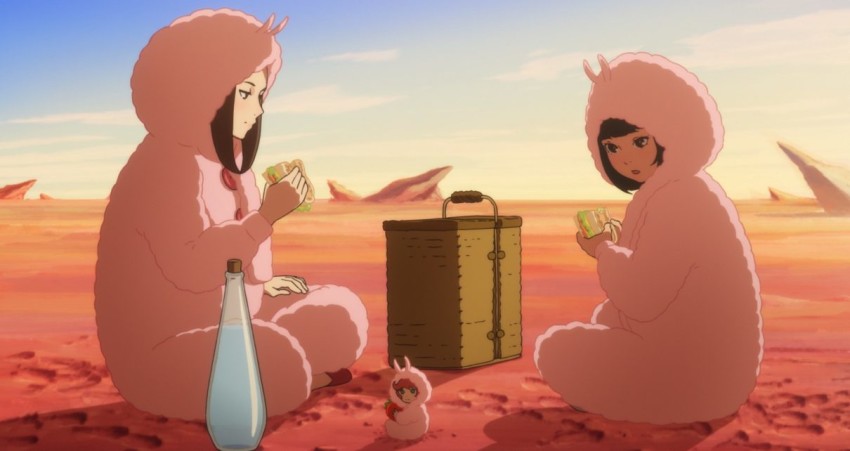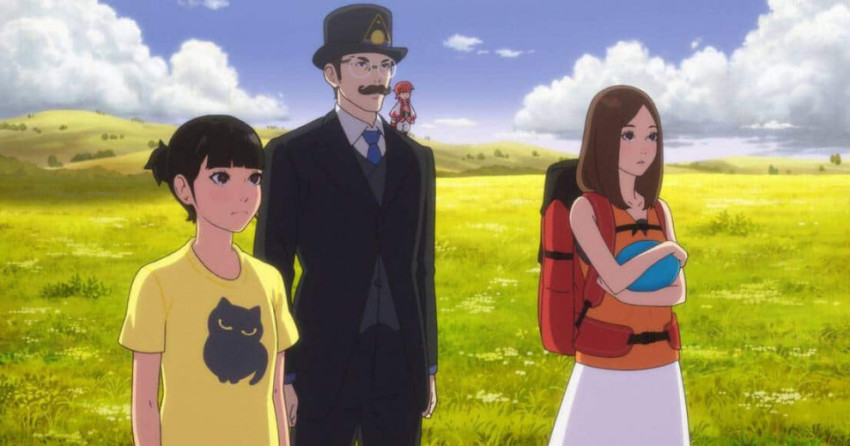Birthday Wonderland
September 17, 2020 · 0 comments
By Andrew Osmond.
 Keiichi Hara’s feature film Birthday Wonderland plays like a very traditional family fantasy, which seems to be part of its point. Given that the film tells the story of a Japanese girl travelling into a magic world, it inevitably raises thoughts of Spirited Away – which was, among other things, a plea for viewers to remember earlier ways of life, to not let the present swallow the past. That’s a theme in Birthday Wonderland too, and it’s stated very explicitly in the script. But Hara’s film also seems like a plea to remember earlier kinds of story.
Keiichi Hara’s feature film Birthday Wonderland plays like a very traditional family fantasy, which seems to be part of its point. Given that the film tells the story of a Japanese girl travelling into a magic world, it inevitably raises thoughts of Spirited Away – which was, among other things, a plea for viewers to remember earlier ways of life, to not let the present swallow the past. That’s a theme in Birthday Wonderland too, and it’s stated very explicitly in the script. But Hara’s film also seems like a plea to remember earlier kinds of story.
In the two decades since Spirited Away, the “youngster goes to another world” story premise has become familiar in anime – all too familiar. If you follow new anime made for TV, you’ll know it’s one of the most overused formulae in Japanese media now. As long ago as 2016, a Japanese short story contest in Japan actually banned tales of characters travelling to alternate worlds.
As I wrote in a previous article, one reason was these stories “could all too easily turn into fan fiction for lazy writers, descending into self-insertion wish-fulfilment. At worst, they’re full of teen ciphers on mechanical quests, so self-absorbed that they negate the point of going to another world.” They also could be massively gamified, adhering to the worldbuilding and conventions of Dragon Quest and its RPG brethren, as if that’s all fantasy ever was.
Birthday Wonderland, though, seems meant to remind viewers that otherworld stories existed before games consoles. It’s based on a 1981 book by Sachiko Kashiwaba, a Japanese writer who’s written a slew of stories about people visiting “other worlds,” going back into the 1970s. But Kashiwaba acknowledged she was following still older traditions; she cited British authors such as C.S. Lewis, who created Narnia in the 1950s, and P.L. Travers, creator of Mary Poppins in the 1930s. In Birthday Wonderland, it hardly seems an accident that the path to the wonderland lies through a lovely shop with shelves full of colourful children’s books, and not a video game cartridge in sight.
True, the Birthday Wonderland film updates Kashiwaba’s story to the present day. The main character, a teenage girl called Akane, has a smartphone… except that sets up a flashback in where we see Akane’s peers cruelly “blank” another girl, who committed the heinous crime of not keeping up with her texts. The reason the girl missed the texts was that she spent a day with her grandmother. Thus, the film niftily sets today’s electronic life in opposition to the values of the past, of connecting to the previous generation.
Akane doesn’t want to go to school, guilty she didn’t stand up for the other girl. She makes fake excuses that her mum sees through; but rather than scold her, mum bundles Akane off to the little shop mentioned above. Supposedly the shop’s owner, a family friend called Chii, has a present for Akane (it’s her birthday tomorrow). Curiously, though, Chii herself doesn’t know anything about it.
 Both Akane and Chii are distracted by a knocking from the cellar under the shop, from which emerges a dapper rake-thin gentleman, in a black suit and top hat. He’s called Hippocrates, and says he’s from another world which Akane is destined to save. And if that seems crazy talk, then there’s also Hippocrates’ companion, a boy doll who comes to life and calls himself Pipo.
Both Akane and Chii are distracted by a knocking from the cellar under the shop, from which emerges a dapper rake-thin gentleman, in a black suit and top hat. He’s called Hippocrates, and says he’s from another world which Akane is destined to save. And if that seems crazy talk, then there’s also Hippocrates’ companion, a boy doll who comes to life and calls himself Pipo.
And so the adventure begins! Akane is bundled to the titular Wonderland, and it’s certainly not like a videogame. It’s more like the Oz of the original L. Frank Baum books, published in America in the 1900s, minus the songs and vaudeville of the Wizard of Oz film version. There’s no real violence; there are malign-seeming enemy characters, but even they prefer scaring people to active cruelty. More importantly, many of the world’s inhabitants are kind and welcoming, starting with the first town where friendly villagers live in symbiosis with giant sheep. One important subplot involves the characters transporting a precious hand-knitted sweater, on which the village’s survival depends!
Like the original Oz books, much of the film consists of journeys through fanciful places and landscapes. The story involves a missing prince and a crucial ceremony to bring back the world’s water, but the journey feels more important than the destination. A vivid set-piece involves the characters negotiating a treacherous rope bridge, then braving a world of giant fish and lily pads. As well as Oz, I was reminded of the whimsy of the animated film Little Nemo: Adventures in Slumberland, co-produced between Japan and America in the 1980s. Hippocrates even looks similar to Professor Genius, a figure in Little Nemo.
However, Western viewers may be surprised by one particular story decision. In classic children’s fantasies – Oz, Narnia, Alice – only children can travel from our world to magic ones, and often it’s just one child per trip. Of course, it’s a way to make things more exciting for kids. Spirited Away keeps to that rule, discounting Chihiro’s pig parents. But Birthday Wonderland blithely breaks the convention. At the start of the film, the shop-owner Chii – who’s certainly an adult – is present when Hippocrates emerges from her basement. She’s completely ready to accept that he’s magic – she’s just infuriated that she’d never been told about the magic world before! Although Hippocrates claims the girl Akane is the “chosen one” who’s destined to save his world, Chii invites herself too, and stays for the adventure’s duration.
Chii’s presence reflects a recurring theme in the stories of Kashiwaba, according to Jonathan Clements’ entry about the author in the Encyclopedia of Science-Fiction. Kashiwaba speculates about how “different ages of reader might approach the same story; [Chii] is a knowing and enthusiastic participant, daring the juvenile reader to return to the adventure a decade later and experience it as a mature adult rather than a callow child.”
And perhaps, strangely, this is the way that Birthday Wonderland feels most up to date. Back when the Oz, Narnia and Mary Poppins books were written, the prevailing social attitude was they were just for children, who should leave such fantasies behind in adulthood. But now we live in a mainstream of fantasy culture, where grown-ups revisit childhood tales as a matter of course.
Will director Keiichi Hara will take these themes further in his future work? One of his previous anime films, Colorful (2010), boldly presented the “real”, sometimes bleak world as if it were a fantasy, viewed by a nameless ghost who’s been reborn in a boy’s body. There are plenty of other potential permutations of fantasy and reality, childhood and adulthood. Maybe Hara, too, should return to Wonderland.
Andrew Osmond is the author of the recently reissued BFI Film Classic on Spirited Away. Birthday Wonderland is released in the UK by Anime Limited.
Leave a Reply